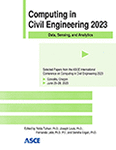Machine Learning-Based Generative Design Optimization of the Energy Efficiency of Florida Single-Family Houses
Publication: Computing in Civil Engineering 2023
ABSTRACT
Designers usually assess only a few house design alternatives simulating their energy use, due to time and cost constraints. This study aims at developing a machine learning (ML)-based generative design (GD) framework to automate the design process of Florida’s detached residences while optimizing their energy performance. An artificial neural network (ANN) model was developed using the machine learning platform TensorFlow along with some Python-based Keras libraries based on a big dataset of around 17,000 newly constructed detached residences in Florida between the years 2009 and 2021. The GD framework was established using Autodesk Dynamo and Autodesk Revit internal generative design tool that uses the Non-Dominated Sorting Genetic Algorithm (NSGA-II). The ANN model was created to predict the required capacities of the cooling and heating systems in detached houses considering 10 independent variables relating to the house geometry and its energy performance. The ANN was then integrated within the GD framework for performance evaluation purposes. The findings of this study included a fully automated design of energy-efficient detached houses greatly reducing the financial strain and time consumed by designers/developers using traditional techniques.
Get full access to this article
View all available purchase options and get full access to this chapter.
REFERENCES
Ascione, F., Bianco, N., De Stasio, C., Mauro, G., and Vanoli, G. (2017). “Artificial neural networks to predict energy performance and retrofit scenarios for any member of a building category: A novel approach”. Energy, 118, 999–1017.
Caldas, L., and Norford, L. (2001). “Architectural Constraints in a Generative Design System: Interpreting Energy Consumption Levels”. Seventh International IBPSA Conference, IBPSA, Cambridge, MA, USA, 1397–1403.
Cebrat, K., and Nowak, Ł. (2018). Revealing the relationships between the energy parameters of single-family buildings with the use of Self-Organizing Maps. Energy and Buildings, 178, pp. 61–70.
Chen, K., Janssen, P., and Schlueter, A. (2018). “Multi-objective optimisation of building form, envelope and cooling system for improved building energy performance”. Automation in Construction, 94, 449–457.
Elias, R., and Issa, R. A. (2019). “Big Data: A Decade of Energy Characteristics of Single-Family Homes in Florida”. In Proceedings of the 1st ACM International Workshop on Urban Building Energy Sensing, Controls, Big Data Analysis, and Visualization (UrbSys'19). Association for Computing Machinery, New York, NY, USA, 101–111. DOI: https://doi.org/10.1145/3363459.3363533.
García Kerdan, I., and Morillón Gálvez, D. (2020). “Artificial neural network structure optimisation for accurately prediction of exergy, comfort and life cycle cost performance of a low energy building”. Applied Energy, 280, 2–19.
Khayatian, F., Sarto, L., and Dall’O’, G. (2016). “Application of neural networks for evaluating energy performance certificates of residential buildings”. Energy and Buildings, 125, 45–54.
Moradzadeh, A., Mansour-Saatloo, A., Mohammadi-Ivatloo, B., and Anvari-Moghaddam, A. (2020). “Performance Evaluation of Two Machine Learning Techniques in Heating and Cooling Loads Forecasting of Residential Buildings”. Applied Sciences, 10(11), 3829.
Rahmani Asl, M., Zarrinmehr, S., Bergin, M., and Yan, W. (2015). “BPOpt: A framework for BIM-based performance optimization”. Energy and Buildings, 108, 401–412.
Seyedzadeh, S., Rahimian, F., Glesk, I., and Roper, M. (2018). Machine learning for estimation of building energy consumption and performance: a review. Visualization in Engineering, 6(1).
Sholahudin, A. A. G., Baek, C. I., and Han, H. (2016). “Prediction and Analysis of Building Energy Efficiency Using Artificial Neural Network and Design of Experiments”. Applied Mechanics and Materials, 819, 541–545.
Thill, J. (2020). Generative Design in Energy Efficient Buildings. Michigan Technological University.
Toutou, A., Fikry, M., and Mohamed, W. (2018). “The parametric based optimization framework daylighting and energy performance in residential buildings in hot arid zone”. Alexandria Engineering Journal, 57(4), 3595–3608.
EIA (US Energy Information Administration). (2021). International Energy Outlook 2021. US Energy Information Administration, Washington, DC.
EIA (US Energy Information Administration). (2023). Florida State Energy Profile - Energy Information Administration, US Energy Information Administration (EIA).
Wang, Z., and Srinivasan, R. (2015). “A Review of Artificial Intelligence Based Building Energy Prediction with a Focus on Ensemble Prediction Models”. Winter Simulation Conference, IEEE 2015, Piscataway, NJ, 3438–3445.
Information & Authors
Information
Published In
History
Published online: Jan 25, 2024
ASCE Technical Topics:
- Artificial intelligence and machine learning
- Automation and robotics
- Benefit cost ratios
- Buildings
- Business management
- Computer programming
- Computing in civil engineering
- Energy consumption
- Energy efficiency
- Energy engineering
- Engineering fundamentals
- Equipment and machinery
- Financial management
- Neural networks
- Practice and Profession
- Residential buildings
- Structural engineering
- Structures (by type)
- Systems engineering
Authors
Metrics & Citations
Metrics
Citations
Download citation
If you have the appropriate software installed, you can download article citation data to the citation manager of your choice. Simply select your manager software from the list below and click Download.
